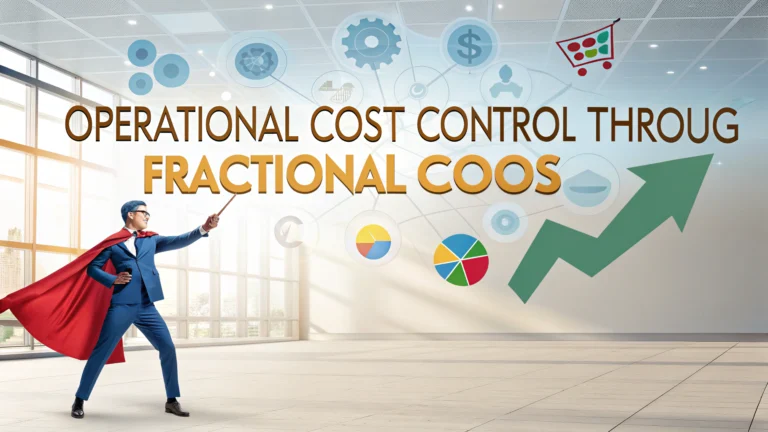A fractional COO can transform how businesses handle their operational costs, bringing executive-level expertise without the full-time price tag.
Small and medium-sized businesses often struggle with managing operational expenses effectively while maintaining quality and efficiency.
This guide explores how fractional COOs help companies optimize their operational costs while driving sustainable growth.
Understanding the Role of a Fractional COO in Cost Control
A fractional COO works part-time or on a contract basis to oversee and optimize business operations.
- Strategic planning and implementation
- Process optimization and efficiency improvements
- Vendor management and negotiation
- Resource allocation and workforce planning
- Technology integration and automation
Cost-Saving Strategies Implemented by Fractional COOs
Experienced fractional COOs typically focus on these key areas for immediate cost reduction:
- Supply chain optimization
- Workflow automation
- Employee productivity enhancement
- Overhead reduction
- Waste elimination
Measuring ROI from Fractional COO Services
Track these metrics to evaluate the impact of your fractional COO:
- Operational cost reduction percentage
- Process efficiency improvements
- Employee productivity rates
- Customer satisfaction scores
- Revenue per employee
Finding the Right Fractional COO
Consider these factors when selecting a fractional COO:
- Industry experience
- Track record of cost reduction
- Communication style
- Availability and commitment level
- Fee structure and terms
Common Cost Control Areas
| Area | Potential Savings | Implementation Time |
|---|---|---|
| Process Automation | 15-30% | 3-6 months |
| Vendor Management | 10-20% | 1-3 months |
| Resource Optimization | 20-40% | 2-4 months |
Implementation Timeline
A typical cost control implementation plan includes:
- Initial assessment (1-2 weeks)
- Strategy development (2-3 weeks)
- Implementation planning (1-2 weeks)
- Execution (2-3 months)
- Monitoring and adjustment (ongoing)
Taking Action: Next Steps
Start your cost control journey with these steps:
- Assess your current operational costs
- Identify key areas for improvement
- Research and interview potential fractional COOs
- Set clear goals and expectations
- Develop a timeline for implementation
Contact professional organizations like COO Alliance or Fractional Executive Network to find qualified fractional COOs.
Benefits Beyond Cost Savings
Fractional COOs deliver additional value beyond operational cost reduction:
- Fresh perspective and innovative solutions
- Knowledge transfer to internal teams
- Scalable operational frameworks
- Risk management expertise
- Industry best practices implementation
Common Implementation Challenges
Internal Resistance
Address these typical obstacles during implementation:
- Employee skepticism of change
- Department silos
- Legacy system dependencies
- Cultural adaptation
- Communication barriers
Mitigation Strategies
Overcome challenges through:
- Clear communication plans
- Stakeholder engagement
- Phased implementation approach
- Regular feedback loops
- Training and support systems
Long-term Strategic Impact
Successful fractional COO engagements create lasting benefits:
- Sustainable cost management systems
- Improved operational resilience
- Enhanced competitive positioning
- Scalable business processes
- Strong vendor relationships
Maximizing Your Operational Transformation
Focus on these key elements for sustainable operational excellence:
- Regular performance monitoring
- Continuous process improvement
- Employee empowerment and training
- Technology adoption and integration
- Data-driven decision making
Remember to document all improvements and maintain updated standard operating procedures to ensure lasting impact from your fractional COO engagement.
FAQs
- What is a fractional COO and how do they help with operational cost control?
A fractional COO is a part-time Chief Operating Officer who provides executive-level operational expertise on a contract basis. They help organizations optimize processes, reduce waste, implement cost-saving measures, and improve operational efficiency without the full-time executive cost. - What are the typical cost savings achieved through a fractional COO?
Organizations typically see 15-30% operational cost reduction through process optimization, vendor management, resource allocation improvements, and streamlined workflows implemented by fractional COOs. - How does a fractional COO identify areas for cost reduction?
They conduct operational audits, analyze financial data, review existing processes, assess vendor contracts, evaluate staffing models, and examine technology infrastructure to identify inefficiencies and potential cost-saving opportunities. - What is the average engagement duration with a fractional COO?
Typical engagements range from 3-12 months, depending on the organization’s needs and objectives. Some may extend longer for ongoing operational oversight and continuous improvement. - How do fractional COOs implement cost control measures while maintaining quality?
They develop balanced scorecards, establish KPIs, implement quality control systems, and create standardized processes that optimize resources while maintaining or improving service/product quality standards. - What industries benefit most from fractional COO cost control services?
Small to medium-sized businesses, startups, manufacturing companies, service-based organizations, and companies in growth or transition phases benefit most from fractional COO services. - How do fractional COOs differ from management consultants in cost control?
Fractional COOs provide hands-on operational leadership and implementation, while consultants typically offer recommendations. COOs are more involved in day-to-day execution and have accountability for results. - What ROI can companies expect from hiring a fractional COO?
Companies typically see a 3x to 5x return on investment through cost savings, improved operational efficiency, and revenue growth, usually within the first year of engagement. - How do fractional COOs ensure sustainable cost control measures?
They establish systems, processes, and metrics that can be maintained long-term, train internal teams, document procedures, and create accountability frameworks that continue after their engagement ends. - What technology solutions do fractional COOs typically implement for cost control?
They often implement ERP systems, automated workflow solutions, inventory management software, project management tools, and data analytics platforms to optimize operations and control costs.







